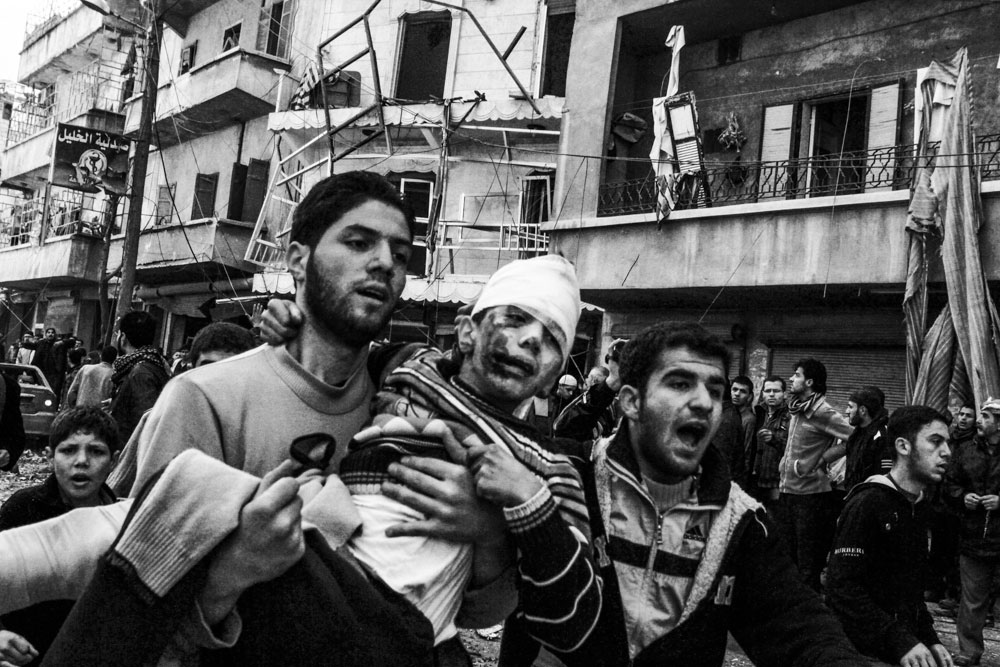Humanity's Dire Straits in Syria
"What I want to say is, don't believe anymore in the United Nations. Don't believe anymore in the international community. Don't think that they are not satisfied with what's going on. They are satisfied that we are now being killed, that we are facing one of the most difficult, or the most serious, or the most horrible massacres that is in our history."
"Russia doesn't want us to go out alive. They want us dead. Assad is the same . . . but at least we know that we were a free people. We wanted freedom. We didn't want anything else but freedom. You know, this world doesn't like freedom, it seems."
Abdulkafi Al-Hamdo, teacher, reporter, activist, Aleppo Old City
"The reports we had are of people being shot in the street trying to flee and shot in their homes."
"There could be many more."
Rupert Colville, United Nations spokesman
"[ . . . ] Coldblooded murders of entire families on the ground who were deemed close to the opposition; summary executions, including of women and children; people burned alive in their homes; the continuation of systematic targeting of hospitals, their staff and their patients."
Jean-Marc Ayrault, French Foreign Minister
 |
| Residents look for survivors after a scud attack on one of the rebel-held neighbourhoods in east Aleppo -- Mauricio Morales/Al Jazeera |
There must be great satisfaction in the Syrian regime now that with the help of Russian air power, the Iranian al-Quds Republican Guard Corps, the Shiite militias, and Lebanon's Hezbollah, the battle almost lost to Syrian Sunni rebels a year ago, has now been irreversibly turned about. Bashar al-Assad left no building block unturned in east Aleppo, infamously firing mortar rounds into dense civilian enclaves, attacking the Syrian "terrorists" by unleashing barrel bombs on their families from Syrian army helicopters.
It remains a tossup whether Moscow or Damascus derived more satisfaction from putting east Aleppo health clinics, hospitals and schools out of commission, bombing them to smithereens, killing health professionals and their patients, sending others to cower in makeshift shelters, hoping the bombs wouldn't win direct strikes for they must surely feel they have so much to offer the suffering humanity representing Sunni Syrians whose crime has been that they felt entitled to equality with their Shiite counterparts.
Abdulkafi Al-Hamdo can rest assured, there are few left in the world of reason, compassion and liberty who view the United Nations and its various arms with anything lesser than contempt; as for trust and hope, who believes that the auspices of the UN hold out either to suffering humanity set upon by their own governments when the R2P doctrine of 'responsibility to protect' has been shunted aside because the world is weary of war crimes of such an unspeakable dimension, and prefers to let jackals have their kill.
The fiction that the combined killing machine of Moscow and Damascus, Tehran and Turkey aimed primarily to target the Islamic State of Iraq and the Levant represented a rickety sanctimonious tale of righteousness that their actions belied mightily. The dreaded atrocities committed by ISIL merely reflect on a more visible, public scale what countries like Saudi Arabia and Iran, Pakistan and Iraq mete out to those guilty of such serious malfeasance as insulting Mohammad and Islam.
The deaths attributed to ISIL, though gruesome and plentiful enough, pale in comparison to the slaughter carried out on its own civilian population by the Alawite Baathist regime of Syrian President Bashar al-Assad who has managed, thanks primarily to Russia, to transition from brutal tyrant who must be unseated, to managerially competent administrator of a destroyed nation, whose rule must be upheld to ensure regional stability. A contention that Assad promoted himself.
Of course, perspective is everything. And the dread tales of inhuman suffering imposed on Syrian civilians may move compassionate hearts worldwide who nonetheless shudder and do nothing, yet those heartbreaking stories represent enemy propaganda, according to Moscow, which Syria's opponents use to slander the regime, while the rebels use civilians as human shields, so what can one expect, after all? Simple logic that eludes horrified outsiders.
 |
| An injured boy is carried to an ambulance after a double tap air strike in Aleppo, a strategy used by the Syrian air force to inflict greater damage -- Maurice Morales/Al Jazeera |
Labels: Atrocities, Civil War, Conflict, Hezbollah, Iran, Rebels, Russia, Syria

<< Home